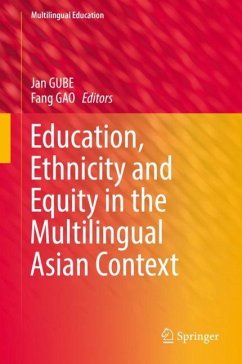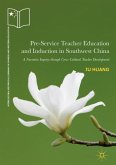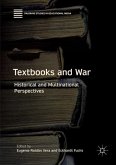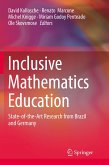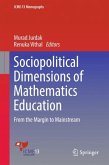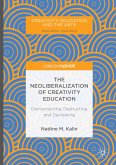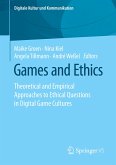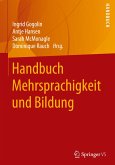Education, Ethnicity and Equity in the Multilingual Asian Context
Herausgegeben:Gube, Jan; Gao, Fang
Education, Ethnicity and Equity in the Multilingual Asian Context
Herausgegeben:Gube, Jan; Gao, Fang
- Gebundenes Buch
- Merkliste
- Auf die Merkliste
- Bewerten Bewerten
- Teilen
- Produkt teilen
- Produkterinnerung
- Produkterinnerung
The book addresses issues related to the education of ethnic minority individuals in the multilingual Asian region. It features recent research and practices of scholars aiming to rethink educational policy and practice surrounding the education of ethnic minority students with a variety of language scenarios in Hong Kong and other Asian contexts. It documents how ethnicity and inequality are played out at policy, school, and individual levels, and how these affect the education of ethnic minorities in their host societies. Using a range of methods, from surveys to interviews and document…mehr
Andere Kunden interessierten sich auch für
![Pre-Service Teacher Education and Induction in Southwest China Pre-Service Teacher Education and Induction in Southwest China]() Ju HuangPre-Service Teacher Education and Induction in Southwest China61,99 €
Ju HuangPre-Service Teacher Education and Induction in Southwest China61,99 €![Textbooks and War Textbooks and War]() Textbooks and War105,99 €
Textbooks and War105,99 €![Inclusive Mathematics Education Inclusive Mathematics Education]() Inclusive Mathematics Education138,99 €
Inclusive Mathematics Education138,99 €![Sociopolitical Dimensions of Mathematics Education Sociopolitical Dimensions of Mathematics Education]() Sociopolitical Dimensions of Mathematics Education41,99 €
Sociopolitical Dimensions of Mathematics Education41,99 €![The Neoliberalization of Creativity Education The Neoliberalization of Creativity Education]() Nadine M. KalinThe Neoliberalization of Creativity Education41,99 €
Nadine M. KalinThe Neoliberalization of Creativity Education41,99 €![Games and Ethics Games and Ethics]() Games and Ethics65,99 €
Games and Ethics65,99 €![Handbuch Mehrsprachigkeit und Bildung Handbuch Mehrsprachigkeit und Bildung]() Handbuch Mehrsprachigkeit und Bildung159,99 €
Handbuch Mehrsprachigkeit und Bildung159,99 €-
-
-
The book addresses issues related to the education of ethnic minority individuals in the multilingual Asian region. It features recent research and practices of scholars aiming to rethink educational policy and practice surrounding the education of ethnic minority students with a variety of language scenarios in Hong Kong and other Asian contexts. It documents how ethnicity and inequality are played out at policy, school, and individual levels, and how these affect the education of ethnic minorities in their host societies. Using a range of methods, from surveys to interviews and document analysis, this book describes the links between language, identity and educational inequality related to ethnic minorities in Asian contexts.
Produktdetails
- Produktdetails
- Multilingual Education 32
- Verlag: Springer / Springer Nature Singapore / Springer, Berlin
- Artikelnr. des Verlages: 978-981-13-3124-4
- 1st edition 2019
- Seitenzahl: 308
- Erscheinungstermin: 20. Februar 2019
- Englisch
- Abmessung: 241mm x 160mm x 23mm
- Gewicht: 618g
- ISBN-13: 9789811331244
- ISBN-10: 9811331243
- Artikelnr.: 54117894
- Herstellerkennzeichnung Die Herstellerinformationen sind derzeit nicht verfügbar.
- Multilingual Education 32
- Verlag: Springer / Springer Nature Singapore / Springer, Berlin
- Artikelnr. des Verlages: 978-981-13-3124-4
- 1st edition 2019
- Seitenzahl: 308
- Erscheinungstermin: 20. Februar 2019
- Englisch
- Abmessung: 241mm x 160mm x 23mm
- Gewicht: 618g
- ISBN-13: 9789811331244
- ISBN-10: 9811331243
- Artikelnr.: 54117894
- Herstellerkennzeichnung Die Herstellerinformationen sind derzeit nicht verfügbar.
Jan Gube is Postdoctoral Fellow at the Department of Education Policy and Leadership, The Education University of Hong Kong. A linguist by training, educational researcher by profession, social scientist by inclination, his work addresses how people make sense of their identities through language, diverse cultures, communities and learning environments. As a result, his publications are related to ethnicity, diversity and equity, among a variety of educational issues. In 2017, Jan received the International Education Association of Australia Outstanding Postgraduate Thesis award. He is writing a monograph Ethnic identities within a multi-ethnic school: Tales and social currencies of Filipino students in Hong Kong (under contract with Springer). Fang Gao is Assistant Professor at the Department of International Education and Lifelong Learning. Her main research interests are minority education and higher education. She has published Becoming a model minority: Schooling experiences of ethnic Koreans in China (Lexington Books, 2010), 27 papers in international refereed journals such as the Journal of Multilingual and Multicultural Development, Race Ethnicity and Education, British Educational Research Journal, British Journal of Sociology of Education, Gender and Education, International Journal of Bilingual Education and Bilingualism, Comparative Education, Educational Research, Educational Review, Teachers and Teaching: Theory and Practice, Current Issues in Language Planning, Asia Pacific Journal of Education, and Asian Ethnicity, as well as 13 refereed book chapters. Her second monograph Power, identity, and second language learning: Teaching and learning Chinese as a second language in China is in preparation and will be published by Routledge. She is also the editor of the upcoming book Tertiary education in Asia and Eurasia: Sustainable policies, practices anddevelopments by Springer.
1 From living in cultural and linguistic diversity to equitable outcomes in education: An introduction.- Part I Language practices and policy.- 2 Ethnicity and equity: The development of linguistic capital for a sub-group of South Asian individuals in Hong Kong.- 3 Identity and investment in learning English and Chinese: An ethnographic inquiry of two Nepali students in Hong Kong.- 4 Linguistic landscape and social equality in an ethnic tourism village in Guizhou, China.- 5 Language as gatekeeper for equitable education: Multilingual education in Cambodia.- Part II Racialized discourse, identity and diversity.- 6 Who is "diverse"?: (In)tolerance, education and race in Hong Kong.- 7 Unresolved tensions in Hong Kong racialized discourse on ethnic minorities: Rethinking differences in educating about ethnic minorities.- 8 Citizenship status and identities of ethnic minorities: Cases of Hong Kong Filipino youth.- 9 A forgotten diaspora: Russia-Koreans negotiating life, education and socialmobility.- 10 The analysis on discrimination experienced by immigrants in Korea and its implications for multicultural human rights education policies.- Part III Education equity and equality: Provisions and interventions.- 11 Ethnic minority youth people's education in Hong Kong: What caused their school failure?.- 12 Critical pedagogy and ethnic minority students in Hong Kong: Possibilities for empowerment.- 13 Parental involvement and participation in university among ethnic Koreans in China.- 14 Addressing ethnic and religious diversity issues in Pakistan: A qualitative content analysis of the recent curriculum policy document.- 15 Power relation and education of the Korean minority in the Japanese Karafuto and Soviet/Russian Sakhalin.- 16 Challenges for interethnic relations, language and educational equity in Asia.
1 From living in cultural and linguistic diversity to equitable outcomes in education: An introduction.- Part I Language practices and policy.- 2 Ethnicity and equity: The development of linguistic capital for a sub-group of South Asian individuals in Hong Kong.- 3 Identity and investment in learning English and Chinese: An ethnographic inquiry of two Nepali students in Hong Kong.- 4 Linguistic landscape and social equality in an ethnic tourism village in Guizhou, China.- 5 Language as gatekeeper for equitable education: Multilingual education in Cambodia.- Part II Racialized discourse, identity and diversity.- 6 Who is "diverse"?: (In)tolerance, education and race in Hong Kong.- 7 Unresolved tensions in Hong Kong racialized discourse on ethnic minorities: Rethinking differences in educating about ethnic minorities.- 8 Citizenship status and identities of ethnic minorities: Cases of Hong Kong Filipino youth.- 9 A forgotten diaspora: Russia-Koreans negotiating life, education and socialmobility.- 10 The analysis on discrimination experienced by immigrants in Korea and its implications for multicultural human rights education policies.- Part III Education equity and equality: Provisions and interventions.- 11 Ethnic minority youth people's education in Hong Kong: What caused their school failure?.- 12 Critical pedagogy and ethnic minority students in Hong Kong: Possibilities for empowerment.- 13 Parental involvement and participation in university among ethnic Koreans in China.- 14 Addressing ethnic and religious diversity issues in Pakistan: A qualitative content analysis of the recent curriculum policy document.- 15 Power relation and education of the Korean minority in the Japanese Karafuto and Soviet/Russian Sakhalin.- 16 Challenges for interethnic relations, language and educational equity in Asia.

